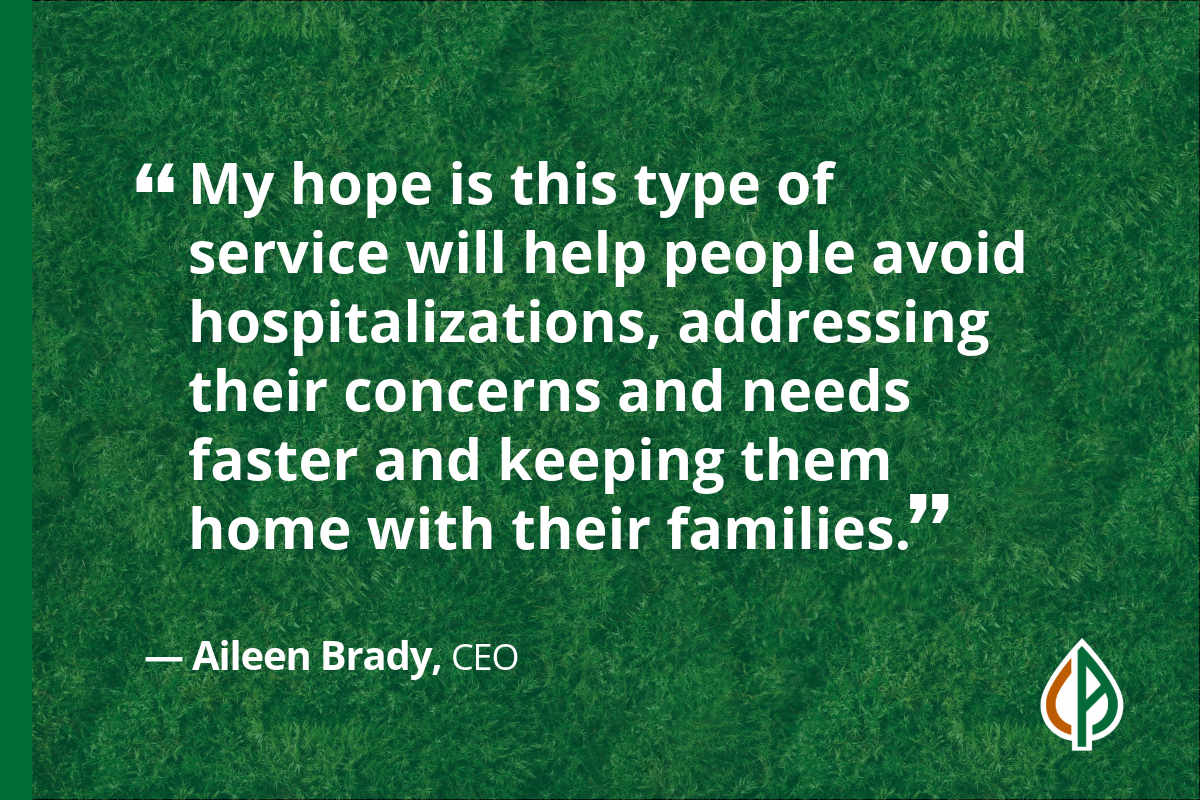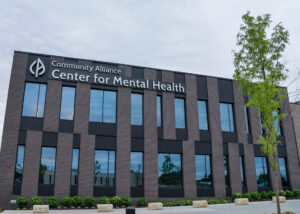Community Alliance’s new mobile crisis team delivers fast, life-saving support

Experiencing a mental health or substance use crisis can be paralyzing for individuals and their loved ones. It can be difficult to know what to do, who to call and how to prevent it again in the future.
That’s why Community Alliance has expanded our services to better address crises. As part of our new Certified Community Behavioral Health Clinic (CCBHC) status in Nebraska, we’ve established a dedicated crisis line and mobile crisis team to meet our community’s needs.
“We learned through our community needs assessment that there continues to be a need for crisis services,” said Aileen Brady, Community Alliance’s CEO. “But it is not always necessary to have law enforcement involved. We are filling that gap in mental health and substance use services with a mobile crisis team that can be activated without calling emergency services.”
If you, or a loved one, is experiencing a mental health or substance use crisis call 402-715-4226 any time for local help. A text number will be available at a later date.
Read on to learn how Community Alliance is implementing national best practices in the Omaha area for crisis support.
Strengthening our continuum of crisis care
Community Alliance’s Safe Harbor peer services have long served individuals in our community with a 24/7 warm line and walk-in crisis services provided by peer specialists. Now, the Safe Harbor phone number has expanded to be Community Alliance’s overarching crisis and warm line (402-715-4226) to support various levels of mental health and substance use crises.
The line is staffed by trained peers who can identify needs and tailor support accordingly — including involving a mental health clinician in the conversation and/or sending out a mobile crisis team to the individual seeking help if necessary.
“It’s a model that’s evolved across the country to move from almost exclusive use of clinicians in crisis teams to using individuals with lived experience,” Aileen said. “The outcomes of this model have proven to be very effective among other crisis teams.”
No matter someone’s reason for calling the crisis line, their first point of contact will be a peer support specialist, many of whom have experienced mental health or substance use challenges themselves and are in recovery. Guided by considerations and toolkits from the Substance Abuse and Mental Health Services Administration (SAMHSA), this peer-driven model produces better outcomes for individuals and their family members who engage in crisis services.
The crisis services team undergoes thorough training, including safety planning, crisis de-escalation and knowledge of community resources such as detox centers and shelters.
What to expect with crisis services
Some calls to the crisis line may be resolved through conversation and connection to resources without the need for a mobile crisis team visit.
When the crisis team is activated, individuals can expect compassionate, trained peer specialists to arrive, accompanied by a clinician in person or virtually if needed. Our mobile crisis team can deliver in-person support within the hour to anyone in a 45-mile radius of Community Alliance in Nebraska.
“During visits, we continue to assess what the individual’s needs are, as well as needs of their extended family if they’re involved,” said Todd Reckling, chief program officer. “We work with them to immediately alleviate or stop the current crisis and create a safe situation for everyone involved. Then, we discuss what needs to happen for interventions, such as a crisis plan or safety plan, and we talk about what other steps can be put into place to reduce the chance of it happening again in the future.”
Within 24 to 48 hours after delivery of crisis services, a team member and/or therapist will follow up with the individual about next steps, whether it’s connection to community resources, reconnection with their existing mental health or substance use service providers, crisis psychotherapy sessions with a clinician at Community Alliance or our other services.
“You can only do so much when focusing on mitigating an immediate crisis,” said Jessica Brown, rapid response team manager. “But there might be other things our team observed or heard that we want to follow up on to ensure the crisis doesn’t happen again. The follow-ups are just as important.”
Supporting a more resilient community
Helping individuals through this evidence-based model goes beyond alleviating that moment of crisis — it has a greater impact on their lives, their families’ lives and the health of the broader community. Through crisis intervention and safety planning, individuals and their loved ones are better equipped and empowered to face the next crisis, should it arise.
“My hope is this type of service will help people avoid hospitalizations, addressing their concerns and needs faster and keeping them home with their families,” Aileen said.
Our team serves individuals of all ages experiencing any type of mental health or substance use crisis — or those with heightened concerns about a loved one. Unsure if you fit this criteria? Please call us at 402-715-4226 any time, any day. We’re here for you. The presence of law enforcement is not required to receive these services.
You are also welcome to call or text 988, the National Suicide and Crisis Lifeline, which may connect you with Community Alliance or other local resources depending on your needs.
If you are a Nebraska-licensed clinician looking for an impactful job, our crisis services team is hiring.
“Throughout training, our crisis services peer specialists and clinicians have been really excited to give back to the community and help others,” Jessica said. “This is a new avenue to support people that’s proven effective.”



